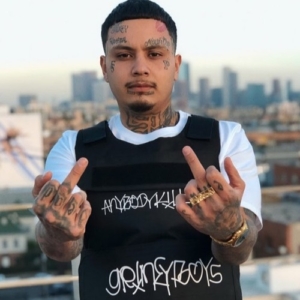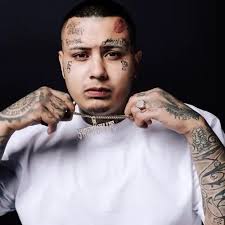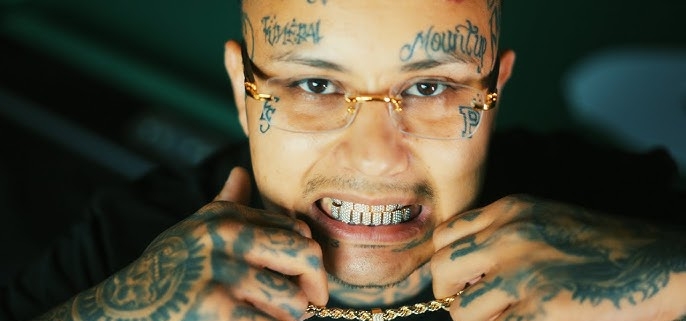Swifty Blue Opens Up on Joining Eastside Paramount: “I Didn’t Want the Streets — the Streets Wanted Me”

Los Angeles rapper Swifty Blue is finally pulling back the curtain on how he got caught up in gang life — revealing that his journey into the Eastside Paramount set wasn’t about fame or clout, but survival, loyalty, and the geography he was born into.
Raised in Paramount, a tight-knit Latino city wedged between Compton, Long Beach, Lynwood, and Norwalk, Swifty’s story mirrors that of many first-generation kids navigating identity, poverty, and pressure. His Salvadoran parents came to the U.S. chasing stability — both eventually becoming citizens — but the streets around them told a different story.
For Swifty, the most powerful influence wasn’t a rapper or a street legend — it was his older brother, 10 years older, in and out of prison on attempted murder charges. As a child, he spent weekends riding with his mother to visit him, learning early what the system looked like from the inside.
“I used to see my mom cry on those long drives,” Swifty recalled. “That’s when I knew I never wanted that life — but it was already around me.”
🩸 “I Got Jumped In — Not Walked In”
By 16, loyalty overpowered hesitation. Swifty says he was jumped in, not eased in — a distinction that mattered to him.
“We didn’t do this for likes or followers. My hood was a real hood,” he explained.
But there was a twist — his mother’s house was in rival territory. While his friends claimed the Eastside, he lived among enemies. Overnight, everyday routines became dangerous: walking home meant dodging old feuds, fighting kids he’d grown up with, and constantly watching his back.
“It wasn’t about proving I was tough,” he said. “It was about making it home.”
💭 “Prison Was Never the Dream”
Swifty’s perspective on gang life sharply contrasts the glorified “Pelican Bay” myth that floats through Southern California neighborhoods. He says he never wanted to be a “shot-caller” or end up on lockdown.
Watching his brother’s years behind bars broke any illusions he might’ve had.
“I seen my family struggle to send money, visit, hold it down. There’s nothing glamorous about that,” he said.
Still, he admits the environment molded him. The set wasn’t just about violence — it was brotherhood, protection, and belonging in a city that offered little else.
“We looked out for each other,” he said. “It wasn’t about catching bodies — it was about making sure your homie made it home.”

🏫 School, Juvie, and the Real Education
Swifty’s school life spiraled fast. He was expelled for smoking, tagging, and vandalism — then cycled through juvenile hall before finishing high school behind bars.
Inside, he said, the chaos was constant — more fades than stabbings, but the tension never stopped.
“You learn fast in there,” he said. “Politics everywhere — who you eat with, who you talk to. And once you get out, the cops treat you like you’re guilty of everything anyway.”
He also cleared up years of online confusion about his set: Eastside Paramount isn’t MTC, and he wasn’t involved when Operation Knockout, a major gang indictment, hit the city.
“When all that went down, I was still a kid,” he said. “That’s not my story — my story came after.”
⚠️ Living in a Border War
Swifty’s most dangerous challenge wasn’t police raids or prison politics — it was geography. His front door sat inside enemy turf, forcing him to navigate invisible lines every day.
“You can’t just walk anywhere,” he explained. “It’s a map in your head — what blocks you can cross, what streets you can’t. One mistake could end it.”
That constant pressure, he says, breeds paranoia — but also awareness. It taught him discipline, how to read a room, and how to move carefully in a city where your last name, tattoo, or even neighborhood slang can define you.
💀 From Survival to Spotlight
Now, as reports swirl that Mexican Mafia members were charged in a plot to kill him, Swifty’s reflections carry new weight.
“I didn’t want the streets — the streets wanted me,” he said bluntly. “Once you’re from somewhere, you can’t erase that. You just try to make it mean something different.”
He sees his music not as glorification, but as a memoir — a record of how loyalty, poverty, and proximity shaped a teenager into someone the system expected to fail.
“It’s not a gangster story,” he said. “It’s a family story that got caught in the wrong neighborhood.”
🚨 Bottom Line
Swifty Blue’s story isn’t about rebellion — it’s about reality. A first-generation kid caught between two worlds, he was raised by working parents but pulled into a system older than both of them.
From enemy borders to near-death beefs, his journey shows how loyalty and geography can trap anyone born in the wrong zip code — and how survival sometimes means redefining what “gangsta” really means.
“I didn’t join for fame,” Swifty said. “I joined because it was already home.”
👉 For more livestream moments, visit The Urban Spotlight Homepage






Leave a Reply
Want to join the discussion?Feel free to contribute!